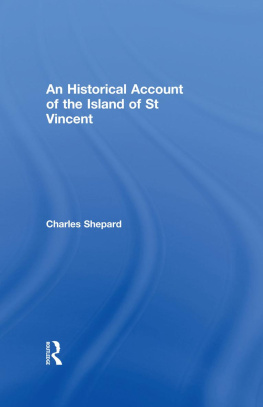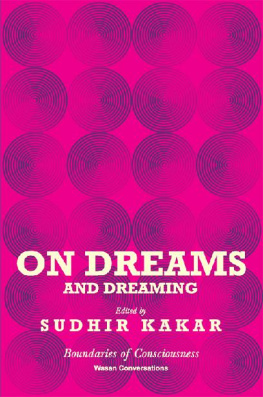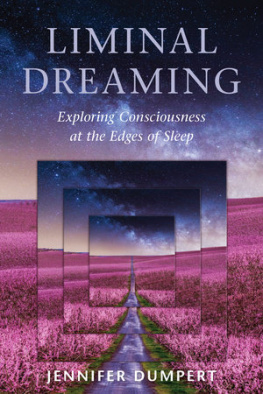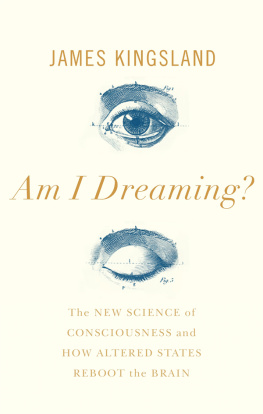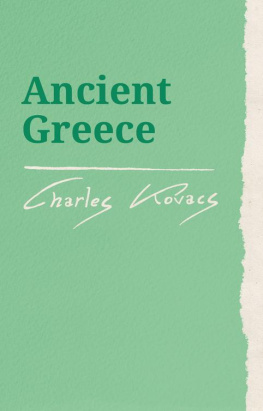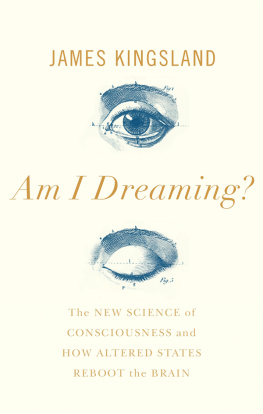The University of Chicago Press, Chicago 60637
The University of Chicago Press, Ltd., London
2017 by The University of Chicago
All rights reserved. No part of this book may be used or reproduced in any manner whatsoever without written permission, except in the case of brief quotations in critical articles and reviews. For more information, contact the University of Chicago Press, 1427 E. 60th St., Chicago, IL 60637.
Published 2017
Printed in the United States of America
25 24 23 22 21 20 19 18 17 16 1 2 3 4 5
ISBN-13: 978-0-226-42524-5 (paper)
ISBN-13: 978-0-226-42538-2 (e-book)
DOI: 10.7208/chicago/9780226425382.001.0001
This book was originally published by the Department of the Classics, Harvard University, in the series Cultural Politics, Socioaesthetics, Beginnings.
Library of Congress Cataloging-in-Publication Data
Names: Stewart, Charles, 1956 author.
Title: Dreaming and historical consciousness in island Greece / Charles Stewart.
Description: Chicago ; London : The University of Chicago Press, 2017. | This book was originally published by the Department of the Classics, Harvard University, in the series Cultural Politics, Socioaesthetics, Beginnings | Includes bibliographical references and index.
Identifiers: LCCN 2016025378 | ISBN 9780226425245 (pbk. : alk. paper) | ISBN 9780226425382 (e-book)
Subjects: LCSH: GreeceHistoryPhilosophy. | HistoriographyGreeceHistory. | DreamsGreeceHistory. | IslandsGreeceHistory. | Consciousness.
Classification: LCC DF755.S74 2017 | DDC 949.5/85dc23 LC record available at https://lccn.loc.gov/201625378

This paper meets the requirements of ANSI/NISO Z39.481992 (Permanence of Paper).
DREAMING AND HISTORICAL CONSCIOUSNESS IN ISLAND GREECE
With a New Preface
Charles Stewart
The University of Chicago Press
Chicago and London
For Deena and Adam
CONTENTS
PREFACE TO THE PAPERBACK EDITION
There can be no doubting that history and anthropology are closely related subjects. Both seek to understand the world from the viewpoint of people, whether separated from us by time or space. Complementarities between the two disciplines have been encapsulated in well-known formulations: historians study history going forward while anthropologists approach it from the present and go backward; historians study the conscious and anthropologists the unconscious dimensions of social life; or, historians start from event and go to structure, whereas anthropologists proceed from structure to event. Dreaming and Historical Consciousness in Island Greece exposes another point of separation between history and anthropology, one that has not yet assumed proverbial form. It goes like this: Historians produce histories according to Western standards of evidence and rational argumentation while ethnographers study any given communitys production of histories. In between these approaches the important matter of truth lies unsettled.
Villagers in the mountains of Naxos accept, on the basis of dream visions, that Egyptian Christians came to their area in late antiquity. As an ethnographer I could see that local society has taken its historical scenarios seriously, and some villagers even claim to have been eyewitnesses at miraculous events such as the sudden gushing forth of a spring (holy water) on a dry mountainside in 1930. This book attempts to understand the poetics, the cosmology, the politics, and other social practices that make such accounts of the past credible for a community. It could be said that whereas historians subscribe to a correspondence theory of truth in which assertions must correspond to verifiable evidence, ethnographers work with a coherence theory that observes how propositions about the past mesh with local expectations and come to be accepted.
objected that I was recommending histories produced by dreaming over the accounts of professional historians. The mountain district of Kronos on Naxos and academic history are certainly two very different communities with divergent ways of knowing the past. The researcherwhether historian or anthropologistmust decide which epistemology will guide their study and what their attitude will be toward other epistemologies. For some, this might be a point where history and anthropology must necessarily part ways. In contrast to rigorously researched histories, indigenous histories may be viewed as marginal curiosities, if not as substandard and false. I think, however, that the friction here indicates an area of creative interchange between anthropologists and historians that has not yet been fully realized. One might approach local sensibilities about the past as ontologicalas grounded in a different realityand consider how they might inspire new ways of thinking about our own relationships to the past. One may dive into other epistemologies of the past and attempt to retrieve local histories in a manner consistent with indigenous precepts and practices, perhaps representing them in novel forms. Or, to consider just one more option, one may view other histories within a postcolonial framework and consider the circumstances of their subordination and the possibility of reasserting them.
Histories can expand into myths and myths may contract into histories; truth can become fiction, and vice versa. Historians who have written about topics such as witchcraft or anti-Semitism have dealt with dubious propositions that have been taken as truths with profound consequences. In Dreaming and Historical Consciousness I move from establishing how and why the people of Kronos considered the Egyptians as actual forbears, through the Greek states rejection of the villagers Christian historicity, to an examination of how the community activated the Egyptians again and again as elements of a myth-dream. In so doing, I bring an anthropological idea of historicity (as a social relationship to the past) into dialogue with the historians sense of historicity as accepted factuality.
These matters are not all in the past, and probably never will be. When I completed this book the Kronos myth-dream was still smoldering. The large pilgrimage church prophesied in the 1830s was inaugurated in 2010. Built with donations totaling over 3 million euros, the interior still requires considerable work, and, despite the fact that Greece is mired in a deep financial crisis, annual donations averaging 50,000 euros have continued to pour in. Pilgrims make many of these contributions during the annual saints day when they flock to the site where the bones of the Egyptians and their wonder-working icons were dug out of the ground, ritually reactivating historical consciousness in the process.
The current economic crisis has plunged a large portion of the Greek population into a precariousness similar to that felt by the people of Kronos during their two major economic catastrophes. In Kronos, these crises provoked temporal excursions, often in dreams, where people communed with the Virgin Mary and figures from the past in order to find bearings in the present. While the current Greek financial crisis has not apparently led to any epidemics of dreaming, it has sparked an intensification of temporal thought. Researchers such as Daniel Knight
LIST OF FIGURES
Photographs are by Charles Stewart unless otherwise noted.

 This paper meets the requirements of ANSI/NISO Z39.481992 (Permanence of Paper).
This paper meets the requirements of ANSI/NISO Z39.481992 (Permanence of Paper).

